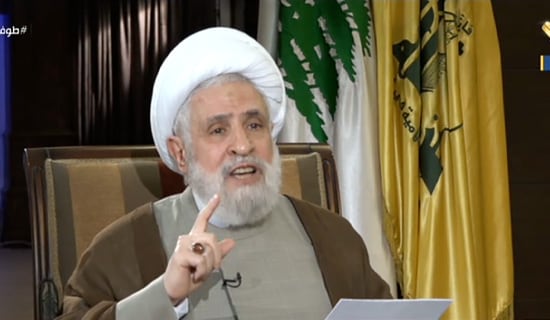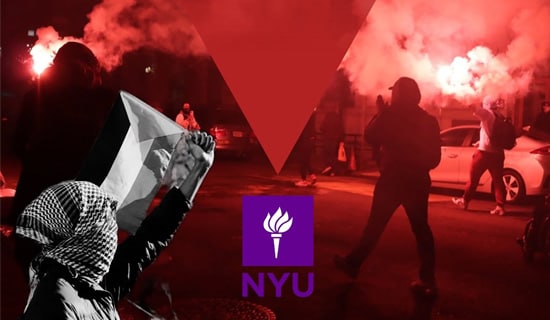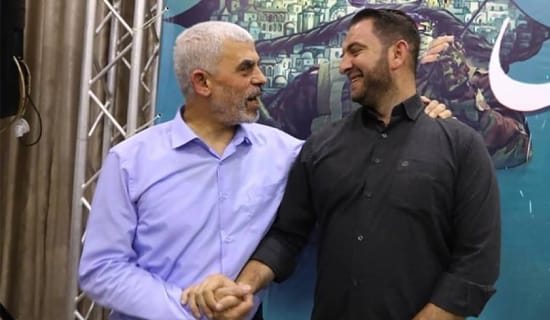Interviews with the Syrian Foreign Minister, Faruq Al-Shara, in the Lebanese daily Al-Safir on January 19 and 20, 2000, along with leaks to the Arab newspaper Al-Hayat (January 19, 2000) gave detailed accounts of the Syrian reasons for breaking the third round of negotiations in the U.S. and presented Syrian complaints against Israel and the U.S.:
Syria’s Reasons for Breaking the Third Round of Negotiations
"We were waiting for the Americans to inform us that the Israeli side was ready to enter into negotiations on… [Israeli] acceptance of the principle of withdrawal to the June 4, 1967 line," Foreign Minister Al-Shara stated. "Without this commitment, our return to the talks would be in vain. We are not fans of negotiating for the sake of negotiating. We bore Barak's procrastination and were patient with his unending attempts to delay convening the Borders Committee and the discussion of the withdrawal for a long time. The American host hinted to us that we must give him more time and that we must understand his sensitive domestic situation."
"[However], the Israeli side did not show up for the first meeting of the Borders Committee. When they [finally] showed up, on the last day of the talks, it became totally clear to us that they came to polemicize and evade the heart of the matter. We informed the Americans very clearly… that we might not return [to the US to resume the negotiations] if we did not sense a serious Israeli intention to enter into the central issue: The withdrawal to the June 4, 1967 line. There will be no resumption of the negotiations without an Israeli confirmation of the principle of withdrawal. We assumed that the Americans had received such a commitment..."[1]
Walid Shqeir, Al-Hayat's reporter in Beirut, gives five reasons for the Syrian decision not to resume the negotiations:
- 1. No agreement was reached [to begin with] that the negotiations would resume on January 19. [On the contrary], the Syrian delegation informed the Americans when it was leaving Shepherdstown that it would reassess [the talks] and consider the date of the next round.
- 2. The Israelis used "bluffing" tactics. They did not even mention the word "withdrawal," always using the term "redeployment." They did not deliver any commitment or even hint at the possibility of a commitment to withdraw to the June 4, 1967 line…
- 3. Some of Barak’s demands were provocative...:
- [The demand] that the Jewish settlers remain in the Golan…
- [The demand] that, as part of the Security Guaruntees, the Syrian army be withdrawn as far as the city of Homs. This would entail the redeployment of bases and huge installations to which Damascus cannot possibly agree, whatever the price may be.
- [The demand] that the early warning station on Syrian land be operated by a multinational force with Israeli participation, but without any Syrian presence.
- 4. ...On the last day of the talks…while Al-Shara was on his way to the last meeting, a member of his delegation handed him a report on the statements made by Israeli Foreign Minister, David Levy to the Israeli media [that there will be no withdrawal to the June 4 line], which made the Syrians decide that this "has gone too far." Moreover, the text of the American document at the conclusion of the Shepardstown talks [which was leaked] to Ha'aretz, included all the Israeli provocative demands mentioned above.
The Syrians thought that the secrecy of the negotiations, on which Washington insisted, had been violated [by Israel]. "Where is the 'mushroom diplomacy' [that, in Secretary Albright's words, "grows better in darkness,"]?... Are the negotiations [to be] conducted in the press?..."[2]
Minister Shara's Feelings About the Negotiations
"You are in a war. A military war may even be easier [than the war of negotiations]," Al-Shara stated. "Your nerves are tense all the time. You must pay attention to each word and movement… to all the attempts at foot dragging and 'robbing' a photo-op from you… to all the attempts to embarrass you in front of the [American] host and the world public opinion…to all the attempts to distort your positions, by presenting it as 'extreme' on the verge of supporting 'terrorism'…"
"You struggle with a strong enemy on 'its own soil', more or less. [For] the US is not a Syrian ally, but rather a historic ally of Israel. You must accept the U.S. as mediator and 'fight' on its front, in order to achieve relative neutrality or rather in order to make your position understood and accepted or to distance [the US] from the common Israeli logic; so that it will listen to you and fulfil the role of the 'broker,' even if just in a limited way."
"In addition, you are burdened with Arab precedents [of negotiations and agreements conducted by other Arab states] that you are not prepared to accept as a model, without defaming your former brothers and comrades in arms. You don’t [seek] another Camp David or another Oslo Accord, nor another Wadi Arabe Agreement [the Israeli-Jordanian Peace Accord]. And, although our adversary knows you are different from all the others, he keeps trying, if not to change your position, than at least to embarrass the American side or embarrass you along with the Americans.…"[3]
The First Round of Negotiations at the White House
Al-Safir reports: "There was a clear and specific agreement about the opening ceremony [on December 15]: There would be no bilateral meetings, no handshake, and no speeches…. The meetings will be held only [in the presence of] the hosts... Clinton would give a short speech and then we would start working. But when we were already in the White House, everybody was surprised to find that the ceremony had been transferred to the freezing White House lawn... Also, Barak expressed his desire to give a short speech and therefore, Al-Shara had to speak on behalf of Syria. Al-Shara, as he always does, prepared himself for such a possibility. He wrote a speech on the airplane that was translated into English just in case..."[4]
The Second Round of Negotiations at Shepherdstown
SUPPORT OUR WORK

Al-Safir reports: "The attempts to embarrass [the Syrian delegation] did not end…. Barak was the one to try most... one of the peculiar attempts took place in the gym. Each delegation reserved the gym for specific hours in order to prevent a meeting or an accidental clash [with the Israelis]. In one of the hours reserved for the Syrian delegation, Faruq Al-Shara and Syrian Legal Advisor, Riyadh Al-Daudi, were surprised to see Barak storming in. It was an unhappy surprise. Barak tried to make small talk but when nobody replied, he apologized and withdrew."[5]
The Americans Advise the Syrians
According to Al-Safir, "When the Americans felt that the Syrian delegation was too frustrated by Israeli procrastination, they told the Syrians about what happened in a similar situation in the Netanyahu-Arafat negotiations at Wye."
"Netanyahu was stubborn regarding the Palestinian demands. When Arafat asked Clinton to press Netanyahu, the Israelis became even more extreme and threatened to leave [the negotiations]. And indeed, there were Israeli instructions to take the suitcases down to the entrance hall."
"The Palestinians felt the danger of missing the opportunity and showed 'flexibility' which allowed Clinton to 'persuade' Netanyahu to return to the negotiations table. The Americans whispered, at the end of this story, that the Israeli suitcases were empty but their sight [on the way out] was enough to change the Palestinian position."[6]
The Negotiations on the Lebanese Track and Hizbullah’s Operations
Al-Safir reportes, "Barak never tired of talking about Lebanon and the need to incorporate it into the negotiations. He kept stating that he is ready to withdraw from Lebanon in July 2000 or even before. He blamed Hizbullah for being a 'terror organization' and a tool in the hands of Syria with which to pressure Israel.
The Syrian answer was clear: 'How can Lebanon come to the [negotiations] while you still resist any serious discussion of your withdrawal from our occupied land!? When you affirm your withdrawal from the Golan, the invitation of Lebanon would be possible.'
As to Hizbullah, Al-Shara said that it is a big and important political party, not a terror organization. Hizbullah has first rate political thought. When the land of Lebanon is liberated from your occupation, Hizbullah will not engage [with Israel] using a missile that it knows cannot change the balance of power and may even harm its demand to liberate the land."[7]
Israeli Demand for the Expulsion of Palestinian Organizations from Syria
On this issue, Al-Safir writes, the Syrian response was, "First, Syria will not expel a single Palestinian, except on his way to fulfil his Right of Return. Second, These are men of struggle and not terrorists. In any case, they have ceased the armed struggle operations from abroad, but they have a right to continue the political struggle from Damascus or any other place."[8]
The Bottom Line
Syria expressed its position in Al-Safir, in reasonable terms: "We came here in order to regain our land and guarantee the withdrawal through negotiations. We have kept the Armistice Agreement since 1974. We could have prevented Israeli settlers from settling on our land through armed attacks by people who do not lack the willingness to die as martyrs. Yet we want peace and so we came [here]. If the Israelis really want peace, they should withdraw from our land to the June 4, 1967 line."[9]
An Account of the Syrian-Israeli Negotiations
[1] Al-Safir (Lebanon), January 19, 2000.
[2] Al-Hayat (London-Beirut), January 19, 2000.
[3] Al-Safir (Lebanon), January 19, 2000.
[4] Al-Safir (Lebanon), January 19, 2000.
[5] Al-Safir (Lebanon), January 19, 2000.
[6] Al-Safir (Lebanon), January 19, 2000.
[7] Al-Safir (Lebanon), January 19, 2000.
[8] Al-Safir (Lebanon), January 19, 2000.
[9] Al-Safir (Lebanon), January 19, 2000.




